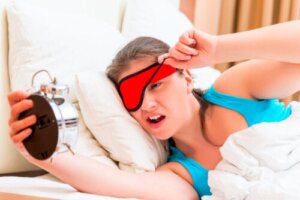10 Myths About Sleep that You Should Stop Believing


Reviewed and approved by the doctor Diego Pereira
You shouldn’t sleep with the TV on, don’t go to bed after dinner… Many of us have heard or read some of these myths about sleep that leave us wondering.
Quality sleep is essential to be able to recover after a long day and fill us with energy. But, in the face of so much information, we often doubt what’s true when it comes to sleep.
While many of these beliefs seem innocent, in some people, they may cause concern. In fact, more than a few people will take actions that will affect their rest, instead of favoring their health, based on common sleep myths.
There are many myths about sleep. Some are just that: myths. Others, however, have a basis of truth. In this article, we’ll introduce and analyze them in the light of scientific research.
1. Eight hours is just right
We need seven to nine hours of sleep; however, the exact amount depends on the person. According to the U.S. Office of Disease Prevention and Health Promotion, seven hours is the minimum healthy for an adult.
So you don’t have to sleep exactly eight hours. If you’re short or if you go a little over, it’s not bad. But try not to make it too much.
Becoming anxious or anxious about controlling your sleep hours can lead to a disorder known as orthosomnia. Beware of this obsession.
2. It’s bad to have your sleep interrupted
One idea that distresses some people is having interruptions in sleep continuity and not sleeping 8 hours at a time. However, this isn’t necessarily serious. In reality, during the night. we have micro awakenings for brief seconds, but then we go back to sleep and don’t even remember it.
In those moments, the body settles down to avoid numbness. Sometimes we tuck or roll over and don’t even remember it. As long as the return to sleep is not too prolonged, a small awakening will not affect rest too much.
However, according to various studies, micro-awakenings may be associated with obstructive apnea and other sleep disorders. So, they could be a symptom to watch out for when they’re very frequent.
Microawakenings are common in many older adults.
We think you may be interested in reading this, too: Biphasic and Polyphasic Sleep: What Are They and When Are They Recommended?
4. We need lots of “beauty sleep”
Among people who love to sleep, there’s a common (and unfounded) belief that these extra hours will make them live longer or healthier. In reality, research says just the opposite.
Too much sleep can be just as harmful as too little sleep. Too much sleep is often associated with earlier mortality, the use of self-medication, and various health problems.
In fact, it increases the risk of cardiovascular disease, since by sleeping more, people are less physically active. In addition, this implies eating at off hours, which in turn contributes to metabolic alterations.
4. Myths about sleep: It’s OK to change your sleep schedule
In addition to the number of hours and continuity of sleep, it’s important to maintain a regular sleep schedule. That is, to go to bed and get up almost always at the same time, even on weekends.
Some people think that if they go to bed late one day, but sleep the eight hours they are supposed to, everything will be fine. However, changing schedules isn’t beneficial, as the body has to readapt later. Especially in adolescents, studies indicate that the lack of a regular schedule is reason enough to disrupt the circadian rhythm.
5. You can catch up on sleep
There are people who deprive themselves of sleep during the weekdays, precisely to be able to fulfill all their obligations. And then, on the weekend, they sleep a little more, in order to “make up for lost time”.
But it doesn’t work like that. Sleeping more on one day doesn’t help to make up for lost sleep on another. It’s like pretending to eat ten times on Sunday for having eaten only twice from Monday to Friday.
The consequences of too little sleep are not only related to health deterioration (obesity, high blood pressure, immune system disorders), but also affect concentration and work and academic performance, as well as mood.
6. The nap myth
As with the previous point, the same principle applies to the nap. If we didn’tsleep well the night before, a nap can help us rest, but the lost hours are not recovered.
There’s also the opposite myth, according to which, if you sleep in the afternoon, you won’t sleep at night. In general, it’s believed that a short nap is good for the body, although it’s recommended that it should not be longer than half an hour. According to studies, long naps are associated with inadequate sleep hygiene.
7. TV or no TV…
Before going to sleep, television doesn’t relax a person – in fact, it’s quite the contrary. Several studies suggest that the habit of using electronic devices (smartphones, tablets, and TV) before going to sleep should be reduced in order to improve the quality of rest. Thus, watching TV at night, lying down, just before going to sleep, is not the best for good sleep hygiene.
8. Myths about sleep: Snoring means someone’s sleeping well
Someone who snores may give the impression of being deeply, if not placidly, asleep. However, people around them (spouse, children, roommates) may not think so.
On the other hand, snoring may not be so harmless for most people. It’s often associated with sleep apnea, according to studies.
9. Alcohol and sleep
Regarding having a drink of alcohol before going to sleep, there are unsubstantiated opinions that defend it. Many claim that it’s beneficial, relaxing, and de-stressing.
But, on the other hand, research reveals that sleep problems are more common among alcoholics. The substance contributes to insomnia and a decrease in total rest time.
10. Will too little sleep really kill you?
Studies have found that there is a high correlation between sleep and a person’s overall physical and psychological health. Consequently, lack of sleep is associated with weight gain, as well as various health disorders, such as high blood pressure, stress, and cardiovascular disease.
Sleep duration has even been linked to longevity. Those who sleep less than 7 hours a day increase the chances of early death for every hour they subtract from their night’s rest, according to scientific reviews.
Like this article? You may also like to read: 7 Interesting Things that Your Body Does in Deep Sleep
Rest is important, no matter how many myths there are about sleep
Having a quality, continuous, peaceful, and restful night’s sleep can be a frustrating desire for many. The number of people with sleep disorders is on the rise, according to the National Sleep Foundation. National Sleep Foundation.
On the other hand, not getting a good night’s sleep has a number of consequences that are not at all positive:
- Fatigue
- Stress
- Obesity
- Anxiety
- Arterial hypertension
- Poor concentration capacity
- Low academic and work performance
Therefore, it’s important to know what we should do or not do in order to get enough sleep in terms of both quantity and quality. That is to say, we must be well informed and not believe in myths about sleep that, far from helping, harm us.
All cited sources were thoroughly reviewed by our team to ensure their quality, reliability, currency, and validity. The bibliography of this article was considered reliable and of academic or scientific accuracy.
- Brower, K. J. (2001). Alcohol’s effects on sleep in alcoholics. Alcohol research & health: the journal of the National Institute on Alcohol Abuse and Alcoholism, 25(2), 110. https://www.ncbi.nlm.nih.gov/pmc/articles/mid/NIHMS4273/
- Choi, N. G., DiNitto, D. M., Marti, C. N., & Choi, B. Y. (2017). Too little sleep and too much sleep among older adults: Associations with self‐reported sleep medication use, sleep quality and healthcare utilization. Geriatrics & Gerontology International, 17(4), 545-553. https://onlinelibrary.wiley.com/doi/abs/10.1111/ggi.12749
- Del Río, S. G., García, V. A. G., & Castellanos, J. L. (2018). Sleep apnea/hypopnea and night bruxism. Revista de la Asociación Dental Mexicana, 75(4), 196-201. https://www.medigraphic.com/cgi-bin/new/resumenI.cgi?IDREVISTA=7&IDARTICULO=81747&IDPUBLICACION=7869
- d’Ortho, M. P. (2019). Ronquidos y apnea del sueño. EMC-Tratado de Medicina, 23(1), 1-8. https://www.sciencedirect.com/science/article/pii/S1636541018416881
- Falbe J et al. Sleep Duration, Restfulness, and Screens in the Sleep Environment. Pediatrics. 2015; 135 (2): e367-e375; DOI: https://doi.org/10.1542/peds.2014-2306.
- Lopez-Jimenez F, Sert F, Gami A, Somers V. Obstructive sleep apnea: Implications for cardiac and vascular disease. Chest. 2003; 290(14): 1906-1914.
- Machado-Duque M, Echeverri J, Machado-Alba J. Somnolencia diurna excesiva, mala calidad del sueño y bajo rendimiento académico en estudiantes de Medicina. Revista Colombiana de Psiquiatría. 2015; 44(3): 137-142.
- Miró, E., Cano Lozano, M. D. C., & Buela Casal, G. (2005). Sueño y calidad de vida Revista Colombiana de Psicología, núm. 14, 2005, pp. 11-27 Universidad Nacional de Colombia Bogotá, Colombia. Revista Colombiana de Psicología, (14), 11-27. https://www.redalyc.org/pdf/804/Resumenes/Abstract_80401401_2.pdf
- Morales‐Ghinaglia, N., & Fernandez‐Mendoza, J. (2023). Sleep variability and regularity as contributors to obesity and cardiometabolic health in adolescence. Obesity. https://onlinelibrary.wiley.com/doi/abs/10.1002/oby.23667
- ODPHP. Trata de dormir lo suficiente – MyHealthfinder. (s/f). Health.gov. Recuperado el 29 de marzo de 2023, de https://health.gov/espanol/myhealthfinder/viviendo-sanamente/salud-mental-relaciones-otras-personas/duerme-lo-suficiente
- Paavonen E, Pennonen M, Roine M, Valkonen S, Lahikainen A. TV exposure associated with sleep disturbances in 5‐ to 6‐year‐old children. Journal of Sleep Research. 2006; 15: 154-161. https://onlinelibrary.wiley.com/doi/abs/10.1111/j.1365-2869.2006.00525.x
- Park J, Ramar K, Olson E. Updates on definition, consequences, and management of obstructive sleep apnea. Mayo Clinic Proceedings. 2011; 86(6): 549-555. https://www.sciencedirect.com/science/article/pii/S0025619611600529
- Silverberg D, Iaina A, Oksenberg A. Treating obstructive sleep apnea improves essential hypertension and quality of life. American Family Physician. 2002; 65: 229-236. https://www.aafp.org/afp/2002/0115/p229
- Yin, J., Jin, X., Shan, Z., Li, S., Huang, H., Li, P., … & Liu, L. (2017). Relationship of sleep duration with all‐cause mortality and cardiovascular events: a systematic review and dose‐response meta‐analysis of prospective cohort studies. Journal of the American Heart Association, 6(9), e005947. https://www.ahajournals.org/doi/abs/10.1161/JAHA.117.005947
This text is provided for informational purposes only and does not replace consultation with a professional. If in doubt, consult your specialist.








